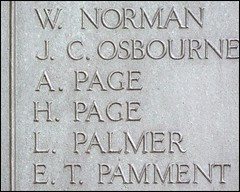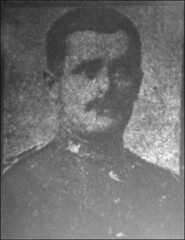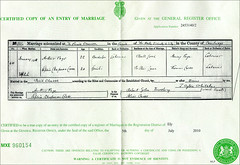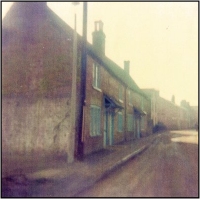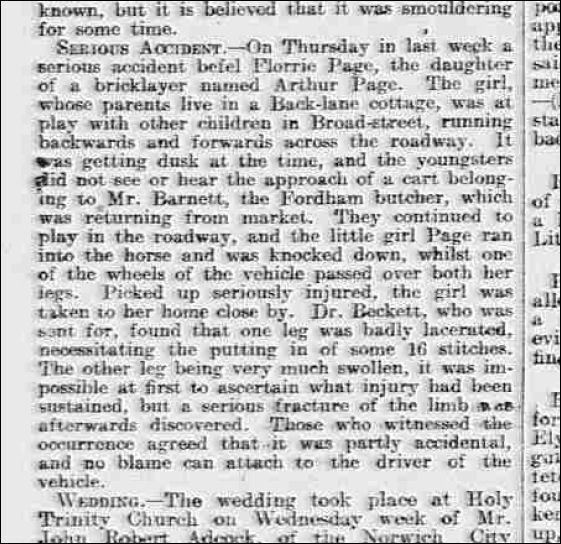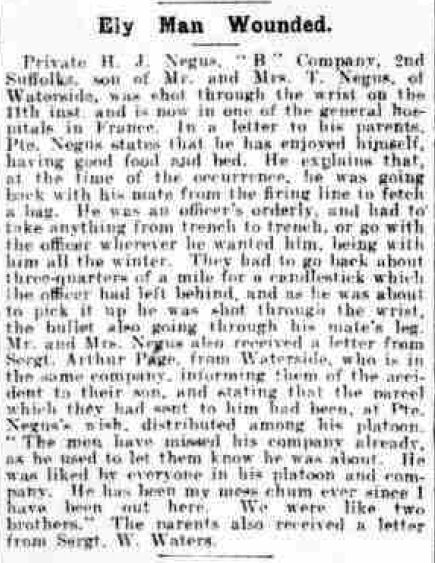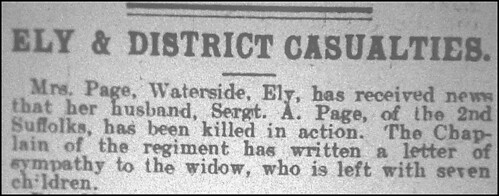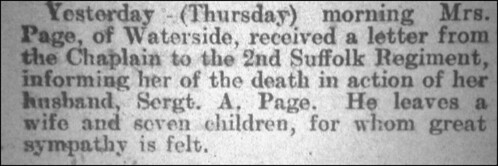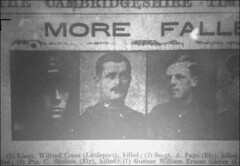MY GRANDPARENTS - I - MY GREAT-GRANDPARENTS - I - MY GREAT-GREAT-GRANDPARENTS - I - MY GREAT-GREAT-GREAT-GRANDPARENTS
KNOTT - I - BOWLES - I - WATERS - I - HARRALL - I - PAGE - I - WISEMAN - I - CROSS - I - CARTER
CORNWELL - I - HUCKLE - I - MORTLOCK - I - MANSFIELD - I - REYNOLDS - I - CARTER - I - ANABLE - I - STEARN
CHRONOLOGY - I - DRAMATIS PERSONAE - I - WHERE PEOPLE CAME FROM - I - CALENDAR
MAP OF ELY - I - MAP OF MEDWAY
MAP OF
CAMBRIDGE AND DISTRICT
WORLD WAR I - I - WORLD WAR II
simonknott.co.uk I home I e-mail
Arthur Page
born Ely,
Cambridgeshire 31st March 1879
died Delville Wood near Albert, France 20th July 1916
on the Page family tree
part of the Page
and Wiseman family stories
married to Sophia Cross
brother of Henry Page, Herbert Page, Robert Page and Thomas Page
father of Phyllis Page
son of
Henry Page
and Alice Wiseman
Arthur Page
(1879-1916). My Father's Mother's Father.
My Great-Grandfather.
The Pages were a large family - Arthur was one of at
least eleven - and lived in the Back Hill area of Ely.
Arthur was married by the age of 22, and worked first as
a baker's labourer and then as a general labourer. During
WWI, Arthur enlisted in the Suffolk Regiment, and was
killed at
the Battle of the Somme on 20th July 1916. He was 37
years old.
Arthur was a Serjeant in the 2nd Battalion of the Suffolk Regiment. On the 20th July 1916, the 2nd Suffolks were engaged at Delville Wood outside the village of Longueval to the east of the town of Albert on the Somme. The Wikipedia entry for the battle at Delville Wood observes that fighting for Delville Wood commenced on 14 July 1916 when the South African Infantry Brigade of the 9th Division captured Longueval and gained a foothold in the neighbouring wood. The wood lay on the right flank of the British line and, along with nearby Waterlot Farm, protected the villages of Guillemont and Ginchy. The Germans resisted strongly in Delville Wood and every gain made by the British was subjected to repeated counter-attack. Consequently the wood changed hands a number of times before it was finally secured by the British on 3 September during the Battle of Guillemont. The 9th Division fought in Delville Wood until 20 July when it was relieved by the 3rd Division and a brigade of the 18th (Eastern) Division.
The 2nd Battalion of the Suffolk Regiment was part of the 3rd Division of the British Army which relieved the South African brigade of the 9th Division on the 20th of July - that is to say, Arthur Page was killed on the first day of his battalion's engagement. Arthur's body was recovered, identified, and buried at Delville Wood cemetery in Longueval, just outside of the town of Albert. We visited Albert in the summer of 2006, but I did not know about Arthur Page at that time, and so we did not go to Longueval. We will have to go back.
His brother Herbert was also killed in WWI, as was his brother-in-law, also called Herbert.
Arthur was two years old at the time of the 1881 census. The Page family were living in Annesdale, Ely, Cambridgeshire. Arthur's father Henry is shown as an agricultural labourer. He was 26 years old. His mother Alice was also 26 years old. Arthur was the fourth of five children at the time of the 1881 census. Henry was 7, William 5, Emma 3, and John less than 1. Arthur was born in Ely, Cambridgeshire, as were his siblings and his mother. His father Henry's place of birth is given as Great Chesterford, Cambridgeshire. Other sources give Great Shelford, Cambridgeshire (Great Chesterford is actually just over the Essex border). The transcript for their entry is here. |
|
On 29th March,
the Cambridge Independent Press reported
that Arthur's father Henry Page, a labourer of of
Willow Walk in Ely, was charged at Ely Petty
Sessions at the instance of Inspector Dixon of
the NSPCC with cruelly ill-treating his
children - Susan (aged 11), Thomas (aged 9),
Charles (aged 7), Sarah (aged 6) and Nellie (aged
1) by wilfully and unlawfully neglecting them.
Henry pleaded not guilty. The charge was brought
because he had failed to provide money for the
family despite his £7 payoff for six months with
the Suffolk Militia. Alice had been able to look
after the family while he had been away, but on
his return she had been forced to live apart from
him because he ill-treated her from time to
time and was unkind to the children. He
demanded from her the money she earned as a
charwoman, leaving her with only a few coppers,
and she was unable to provide enough food for the
children. Henry was given an exemplary sentence
of six months with hard labour. Arthur was twenty-two years old at the time of the 1901 census. The Page family were living on west side of Bull Lane, Ely, Cambridgeshire. Today, this is known as Lisle Lane. Arthur is shown as a baker's labourer. His wife, Sophia Chapman, was 20 years old. Arthur had no children at the time of the census. Arthur was born in Ely, Cambridgeshire, as was his wife Sophia. The transcript for their entry is here. Arthur's mother Alice was forty-four years old at the time of the 1901 census. This Page family were living in Broad Street, Ely, Cambridgeshire. Alice is shown as a charwoman. Her husband Henry was in prison at the time of the 1901 census. She is described as married, and her relationship to the head of household is noted as wife. Alice had seven children at home at the time of the 1901 census. John, an agricultural labourer, was 20, Herbert, an errand boy, was 18, Susan was 14, Thomas was 10 (suggesting that the Thomas who appeared on the 1891 census was ten months, not ten years old), Charles was 8, Sarah 6 and Helen 1. Alice was born in Ely,
Cambridgeshire, as were all the children. The
transcript for their entry is here. |
|
1913: On the 10th October, Arthur was recorded as a bricklayer in an article in the Cambridge Independent Press which reported a serious accident which had befallen his daughter Florence:
1915: The 2nd Battalion spent their first winter and spring bogged down in the trenches of the Vierstraat area of Flanders, before being returned to Billet at Westoutre on 11th April. They spent the latter part of the spring building the network of trenches in the Ypres salient,and then on June 16th they were part of the force which attacked and consolidated its hold in V Wood and Sanctuary Wood to the east of Ypres. It seems that the Battalion came under what were the first prolonged and sustained gas attacks by the Germans on British troops. On 25th June, the Cambridge Independent Press mentions Arthur in a report on the wounding of a young Ely soldier Private H J Negus. Arthur, his sergeant, had written a letter to Negus's parents saying that the men have missed his company already, as he used to let them know he was about. He was liked by everyone in his platoon and company. He has been my mess chum ever since I have been out here. We were like two brothers. Thus, the authentic voice of the past comes through.
During July they returned to billet in Ypres again, but spent the rest of the summer consolidating the hold on the splendidly named Spoil Bank and Bellyache Wood, again to the west of Ypres. In general, the 2nd Suffolks seem to have spent an uneventful 1915 in Flanders, with few casualties, except for one major incident when, on September 8th, the battalion sustained more than a hundred deaths trying to capture a crater in Sanctuary Wood. Shortly after this, Arthur's brother Herbert Page, who had signed up with him but had previously been in the Reserve, was injured, and returned to England. 1916: Arthur's brother Herbert rejoined the Battalion at the start of 1916, when they were moved south towards St Eloi. Shortly after arriving in the area, Herbert was killed. Newspaper reports suggested that he died on the way to hospital, but in fact it seems his body was never recovered, and he has no known resting place. He is remembered on the Menin Gate memorial in Ypres. In June 1916, Arthur Page and the 2nd Suffolks were removed completely from the fighting and returned to depot at St Omer for training in open warfare. They did not know it, but the Generals were preparing for the Big Push, designed to distract the Germans from their assault on Verdun. It would be known as the Battle of the Somme. On July 1st, the first day of the battle, the 2nd Suffolks set out from St Omer for the Somme. They arrived at the front on July 8th, and were placed in reserve, and then on July 14th they were moved into the southern end of Caterpillar Wood, to the east of Albert. Not far off, on July 18th, the Germans attacked and, at great cost to them, overran Delville Wood and part of the town of Longueval. Two companies of the 2nd Suffolks were sent to support the counter-attack, and among them was Serjeant Arthur Page. On Thursday 20th July, Arthur was killed at Delville Wood in the Battle of the Somme, France. He was 37 years old. Shortly before first light on what would be a warm, sunny day, the Third Division of the British Army attacked Delville Wood. Chris McCarthy, in The Somme Day-by-Day, records that Early in the morning the Division made an attack on Delville Wood and village using 2nd Suffolks and 10th Royal Welsh Fusiliers. At 3.35 am the Suffolks advanced from the west, but the two leading companies were almost entirely wiped out. The Fusiliers went astray, and came under fire from a British machine-gun barrage, losing most of their officers, only to press home a fruitless attack. The casualties in the 2nd Battalion were heavy, and among those killed in the attack was Arthur Page. He was 37 years old. It seems to have been a spectacularly foolhardy action: the two companies lost no less than ten officers in the attack, one of them, a Major Congreve, later being awarded a posthumous Victoria Cross. Arthur's body was recovered, identified, and buried at Delville Wood cemetery in Longueval.The Ely newspapers reported the Page family's plight. On 28th July the Cambridgeshire Times, which was incorporating the Ely Standard for the duration of the War, reported that Yesterday (Thursday) morning Mrs Page of Waterside, received a letter from the Chaplain to the 2nd Suffolk Regiment, informing her of the death in action of her husband, Sergt A. Page. He leaves a wife and seven children, for whom great sympathy is felt. On the same day, the Cambridge Independent Press reported that Mrs Page, Waterside, Ely, has received news that her husband Sergt A. Page, of the 2nd Suffolks, has been killed in action. The Chaplain of the Regiment has written a letter of sympathy to the widow, who is left with seven children. |
